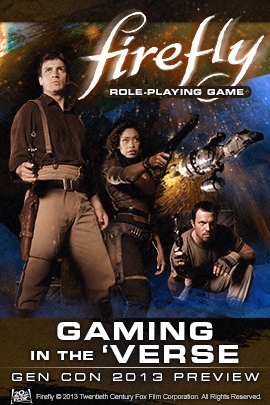
Before I get started on this pile o’ mumblings: a few memorandums and factoids to share… Feedburner has decided to stop being a crab-ass and is now working again. I could say my lack of blogging on the fact that it completely ceased to update for three months or so, but no — I only have myself to blame. In my defense, I’ve been a *touch* embroiled in the Firefly RPG line for Margaret Weis Productions and was helping Rich put together the background work on the Exalted 3rd Edition Kickstarter. It’s Spring here, which means I’m getting outside more (ergo, I’m avoiding Spring cleaning by getting outside and waiting for the weather to warm up so I can re-plant my dead things.)
Definition-wise: I use the word “creative” here to represent “creative professionals” along the lines of sculptors, beaders, painters, musicians, writers, etc. It’s not a left versus right brain sort of a thing. It’s a “this is what I do for a living” thing — either part-time or full-time.
So on that note… Putting on my consultant hat today…
There’s a lot of talking about the publishing/music/etc. industry and “helpful” solutions/advice for creatives to navigate the changes. There’s also chatter about piracy and a lot in defense of it, because who wants to turn down FREE?
Now, I believe that fans don’t necessarily need to know the underpinnings of what a creative does in order to enjoy their work. Some care; some don’t. They tend to care when they love a property or creator and they’re not getting what they want/need in a timely fashion or if their expectations aren’t met. That’s when you’ll start seeing helpful suggestions and whatnot — most of which are not based on business, but perspectives from personal experiences on the consumption end of things. This is natural. There’s nothing wrong with it. It’s going to happen regardless, but that’s not the point of this post.
What’s more interesting to me are the opinions being broadcast from other creatives. Industry commentary is always going on behind-the-scenes. It’s part of being in the business. So, let me get this out of the way by saying I’m not “coming down” on anyone for providing their opinions. That’s not what this is about. What I’m fascinated with is the substance of these discussions and how that might influence my consulting sphere.
Tailoring Thine Model
Most consultants (like myself when I wear that particular hat) don’t make demands on what people should/shouldn’t do. That’s not why we’re hired. My technique to handle consulting is to ask questions, to enable folks to get some perspectives and make decisions applicable to themselves. Usually, making a decision isn’t the hard part, it’s understanding the scope in terms of time (e.g. short-term or long-term). Some people do know their business inside and out, but they may not know how to express what it is they do. Others are primarily focused on a steady income stream — and financial needs vary widely. It’s unique to everyone.
This is part of the reason why proposed solutions fascinate me, because they’re often indicative of that person’s perspective. There’s a *huge* difference in business models between someone who writes-for-hire 100% of the time and those who pen creative works. (As a writer, I have a hybrid model myself, which won’t kick in totally until later this year.) But, it’s not just money… It’s process, rights, and contracts, too. Ages-old turf wars ensue. To agent up or not. Writers-for-hire pen “fan” fiction, so it’s not real work. Original writers aren’t in touch with reality. Etc. Etc. Etc. All of which is total bullshit, IMHO. I never understood the turf wars. You get paid? WRITER. Who cares what you write? When? Happy doing what you’re doing? Good for you! (Personally, I think it does fans a disservice when writers attack one another. I’m sorry, but that’s the way I feel about it. It doesn’t happen very often, but pissing matches have nothing to do with “the work” and more about “ego.” Let’s get excited about reading and enjoying books!)
Now, most of this is pretty typical and the internet is making this more apparent. But, the internet is for public consumption and the way people think about business in general is changing as a result of creatives opening up — sometimes their facts are right, and sometimes they’re really not. Most people are aware that the publishing industry works on volume. Publishers make decisions based on the number of copies sold. Some are dipping into fan communities and online retailers to assess the number of copies read. Even the perception of volume can influence decisions, just like perceived success does. Whether or not that’s based on reality will eventually sort itself out or, as they say: “The truth will out.”
Writers who work within this industry have a thousand different ways they can make money, but when their income stream dries up, because their volume decreases due to market factors, then adjustments have to be made that are uncomfortable and, at times, impossible to manage. I’m not saying it “can’t” be done, but writers have not typically been hired for their business prowess — that’s what agents are for. So the writer can go off and do what they need to: write.
But that’s just one business model. There are others and, arguably, KS is one of them. What you’ll likely see more of, is creatives taking the Amanda Palmer or Matt Forbeck route, and doing a hybrid or “octopus” model. (e.g. It’s dumb to put all your eggs in one basket.) That’s part of what this change is doing, it’s fracturing businesses on a personal level, and because of that, emotions and tensions are running very high right now. This is different from a John Kovalic model, where he has some hybridization right now, but he also has steady work from Munchkin that hasn’t changed from year-to-year for some time.
What’s your model? Do you know where the holes are?
A Sample Assessment
Now, I want to talk about Amanda briefly, as an example of how I normally do these sorts of business-related assessments. Unlike many writers, I’ve never met her yet I did back the KS, I do own her music, and have followed what she’s been doing to varying degrees. (e.g. Totally safer for me to shoot my mouth off ’cause she’s a total stranger and probably will be forever and ever. Heh.) People like Amanda, who incur opinions no matter what they do, are harder to deal with from a business perspective. There’s a few reasons for that and it’s situational. It’s not “All managers are bad” or “All artists are bad.” (Not in a Michael Jackson kind of a way, mind you.)
Ego aside, if you’ve dealt with your fair share of haters, those tend to stand out more than those who adore you. Oscillating between the two is the only way you can survive depending upon your personality. When someone uses strong words, even *if* they have a grain of truth, that message gets lost because of the tone. Same goes for overly positive: “You’re great! Now give me ‘x'” Or a simple: “Keep doing what you’re doing.”
If anything, though, the stormy sea is what sticks in people’s heads, so that’s where I usually start as I balance out the positivity/fandom.
There’s been a lot of criticism aimed at Amanda, most recently due to her poem about the Boston bombing. I am *not* talking about the specifics, but rather something I see as the composite whole. Some artists have a hard time with the business aspects because they’ve a) had a bad experience with a business manager and b) all business is “corporate” ergo evil and counter-intuitive to the creative experience. But, more than that, what I see is someone who either doesn’t want to be a celebrity or doesn’t realize what her recent, meteroic rise has done — Amanda may (or may not) be aware of the fact that she has less freedom than she had before, but this is part of what’s obscuring her message. Her celebrity, coupled with (What I think is ridiculously stupid) the association of “her” in the context of her marriage with Neil Gaiman, has taken on a life of its own.
Do I believe Amanda has something she’s trying to express? A message? Yes, I do. But, I feel, from a business perspective, that her Art is now getting marginalized and shoved aside because of her celebrity and financial success instead of the other way ’round. It’s not the music folks are commenting on, it always seems to come down to the money she raised in the KS or the money she has because of the way people assess her marriage. When she tries to do something for herself, like you or I would, folks come down on her hard. This is a consequence as a result of her celebrity status. Or, what I feel a portion of her audience is trying to say, is that she’s “out of touch.”
If she is/isn’t? Well, I wouldn’t know that without actually talking to her, because her messaging is very erratic. There’s a huge, huge difference between online and off, and though we (e.g. on the consumer side) can only see what that highly visible person is posting — there’s a human being there. I do my best not to make assumptions based on online personas. The reality is often very different from the “image.”
So what would I suggest for her? Find people she’s comfortable with to help her manage her image/message, so she can focus on her Art and to better get her goals across. That’d be where I’d start based on my limited view. They (these people) don’t have to be visible. They don’t have to be corporate. But, having an outsider to bounce ideas off of wouldn’t be a bad thing, because it may help her get more out of her Art and reach the right people. Sure, doing things haphazard is likely part of her overall experience, but I feel she’s getting to the point where that will start backfiring. When it does, a portion of her audience will stop listening. Depending upon how vocal they get, she could have other issues based on the perception that feedback (and how she deals with it) creates.
Now, the aforementioned insight may not mean much long-term in Amanda’s case. Maybe she’ll always have enough fans no matter what she does. Maybe she doesn’t care. Maybe she’s got enough money she doesn’t need to worry about it. Or, maybe she’s perfectly fine with whatever happens. That’s okay. Good business relationships allow for failure because it’s not the consultant’s job to say: “DO THIS OR ELSE.” But, to state: “Here’s something to consider.” However, I do feel there’s a lot of value that can be had through outside perspectives. (There’s a Machiavellian story I could toss at you, but I’ll spare you the details on that, given how long and rambling this post is getting already.)
For the consulting portion of my business, this is an example of the line of thought I’d use to get an outline together for an initial meeting. My thoughts here are based on anecdotes; I’m not looking for right versus wrong. I’m seeking, even for myself, different types of perspectives — and this is a small glimpse into that process. Then, I’d tailor my advice/plan to what that person’s situation is and provide them with options for choices.
Hopefully… HOPEFULLY… This long post will also spark your own ideas about your business model. The stars only know that as my own creative efforts grow, I’ll definitely be seeking out a manager myself!
.




